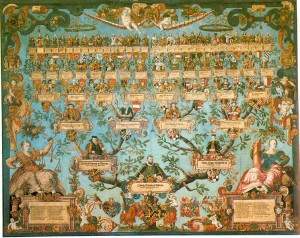I was thinking yesterday how much the nature of genealogical research has changed over the last 2 decades. When I first started in the business my genealogical services were mostly restricted to searching local archives that were within an hour’s drive of where I lived. Finding a local researcher was essential for anyone tracing their family history who could not get to the appropriate record office.
Today, however, almost anyone with internet access can research their own family history using online resources – at least as far back as 1837, using census records and BMD indexes. There is even a growing range of parish registers that can be read online, so if you are lucky, you may be able to press back further than 1837 without leaving your desk.
Does this mean that work for professional genealogists is drying up? Actually, the answer seems to be Absolutely Not!
I seem to busier now than I ever have been. The nature of my work has changed radically (I spend more time at home at my computer than I do at the record office!), but I have a healthily large pile of work folders on my desk and no sign of it drying up.
So – if it’s so easy for people to trace their own ancestry, why do they still need the services of a professional? Here are a few of my ideas. If you have any more, please feel free to comment!
- Even though there are easy-to-use name indexes on many genealogical websites, it is still possible to hit a brick wall and find that an ancestor seems to have completely disappeared from the records. A professional can often get through these brick walls because they often have a better knowledge of how the search engines for each site works, and also how different name spellings and transcription errors can result in an ancestor not showing up in the results. They may also have knowledge of other resources and documents not available online that may help to find the missing ancestor.
- Most professional genealogists have an interest in and studied local and/or general history and can often provide a good understanding of local migratory habits, industries, education and lifestyles. This depth of understanding can enrich your knowledge of your ancestors and what their lives were like.
- While the census and BMD certificates can help you trace your family tree back to the early 19th century, there are many documents that will flesh out the information about a 19th or 20th century ancestor. Only a few of these are available online, and you could be missing out on fascinating information if you only stick to certificates and the census. Wills, directories, occupational records, land records, criminal and military records can all provide you with interesting information about your ancestor.
- Before 1837 your main source of information are parish registers (as well as the other records just mentioned). While some parish registers (particularly for London) are now online, the vast majority are still only available by visiting local archives. Online indexes such as the IGI can be helpful – but should not be relied upon. It is essential ALWAYS to follow up such information by checking out the original documents.
- A professional genealogist will usually have membership of various genealogical societies where they may have access to information not readily available to other members of the public.
- Once you do get beyond 1837, and need to find local researchers, using just one researcher who will sub-hire other researchers on your behalf will save you lots of time – and probably money. If you are following several lines, you will probably find that your ancestors came from many different areas, or you might find one line where the family moved around a lot, and trying to find researchers in each area takes a lot of valuable time, and is not always that easy. A researcher who will act as an overseer, and collate all the information for you makes it all very much easier for you.
I think that as long the professional genealogist keeps up to date with modern changes and moves with the times, there will always be work available. In many ways, I find it more satisfying now than it used to be. Instead of most of my jobs just covering the one area, I very often have charge of the whole tree, and am able to get involved in a far more in-depth way than ever before.
For more information about my own genealogical services, covering the whole of the UK, CLICK HERE.
Ros


